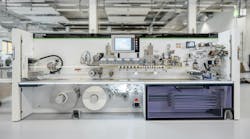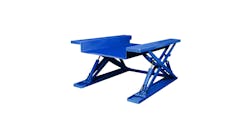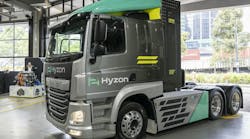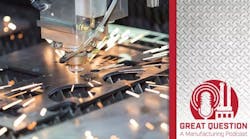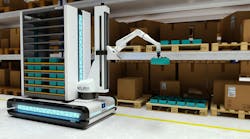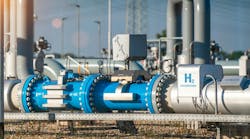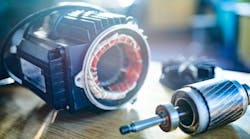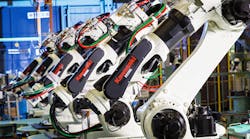By Chris Cooper and Kiyotaka Matsuda
Kawasaki Heavy Industries Ltd. is predicting sales of its robots will get a boost from a labor squeeze in the world's largest manufacturing nation.
Robot sales at the company will climb at least 67% in the next four years, to 100 billion yen ($923 million) in the 12 months starting April 2020, Kawasaki Heavy President Yoshinori Kanehana said in an interview in Tokyo. Sales will be led by China, where demand is rising for robotic car-assembly and two-armed robots used by computer and mobile-phone makers, he said.
The Japanese maker of industrial products ranging from aircraft parts to ships and trains forecasts that sales will be led by China's $11 billion robot market as the nation's working-age population shrinks and it faces a long-term shortage of skilled workers in some sectors. Kawasaki Heavy has sold about 2,000 of its two-armed duAro robot to buyers such as mobile-phone makers and food manufacturers since beginning mass production of the product two years ago, Kanehana said.
"We expect demand in China to keep increasing for the next few years," he said Aug. 25. "The country is suffering from a lack of workers. They need more robots."
Kawasaki Heavy is targeting annual sales of 5,000 units of duAro, which retails at 2.8 million yen each and is produced at a factory in Chongqing, southwest China. The Kobe-based company also sees sales of its automotive robots, made in Suzhou, eastern China, climbing 75% to 7,000 units in the current year ending March 31.
Kanehana said the medical field is key to helping the company challenge the dominance of other robot manufacturers including Japan's Fanuc Corp., Switzerland's ABB Ltd. and Germany's Kuka AG.
Kawasaki Heavy plans to start sales of a surgical robot in 2019, after getting approval from the U.S. Food and Drug Administration, Kanehana said. The company is developing the product with Medicaroid Corp., its venture with Kobe-based Sysmex Corp. It is counting on medical robots to help boost its sales to more than 200 billion yen in the next 10 years, he said.
Robotics is part of Kawasaki Heavy's precision machinery division, which accounted for 10% of the company's total sales of 1.52 trillion yen in the year ended March, and about 29% of overall operating profit.
